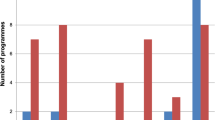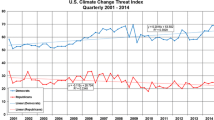Abstract
Eminent climate scientists have come to consensus that human influences are significant contributors to modern global climate change. This study examines coverage of anthropogenic climate change in United States (U.S.) network television news – ABC World News Tonight, CBS Evening News and NBC Nightly News – and focuses on the application of the journalistic norm of ‘balance’ in coverage from 1995 through 2004. This study also examines CNN WorldView, CNN Wolf Blitzer Reports and CNN NewsNight as illustrations of cable news coverage. Through quantitative content analysis, results show that 70% of U.S. television news segments have provided ‘balanced’ coverage regarding anthropogenic contributions to climate change vis-à-vis natural radiative forcing, and there has been a significant difference between this television coverage and scientific consensus regarding anthropogenic climate change from 1996 through 2004. Thus, by way of the institutionalized journalistic norm of balanced reporting, United States television news coverage has perpetrated an informational bias by significantly diverging from the consensus view in climate science that humans contribute to climate change. Troubles in translating this consensus in climate science have led to the appearance of amplified uncertainty and debate, also then permeating public and policy discourse.
Similar content being viewed by others
References
Adger WN, Benjaminsen TA, Brown K, Svarstad H (2001) Advancing a political ecology of global environmental discourses. Dev Change 32:681–715
Argrawala S (1998a) Context and early origins of the intergovernmental panel on climate change. Clim Change 39:605–620
Argrawala S (1998b) Structural and process history of the intergovernmental panel on climate change. Clim Change 39:621–642
Bennett WL (2002) News: the politics of illusion. Longman, New York.
Boehmer-Christiansen S (1994) Global climate protection policy: the limits of scientific advice part 1. Glob Environ Change 4:140–159
Boykoff MT, Boykoff JM (2004) Bias as balance: global warming and the U.S. Prestige Press. Glob Environ Change 14:125–136
Bruggers J (2006) Watchdog earth: for greens, the T.V. News Blues, July 31, available at http://www.courier-journal.com/blogs/bruggers/2006_07_01_archive.html
Crowley TJ (2000) Causes of climate change over the past 1000 years. Science 289:270–277
Dunwoody S, Peters HP (1992) Mass media coverage of technological and environmental risks. Public Underst Sci 1:199–230
Edwards PN, Schneider SH (1997) The 1995 IPCC report: broad consensus of “scientific cleansing? Ecofables/Ecoscience 1:3–9
Entman R (1989) Democracy without citizens: media and the decay of American politics. Oxford University Press, Oxford, UK
Falkowski PR, Scholes RJ, Boyle E, Canadell J, Canfield D, Elser J, Gruber N, Hibbard K, Hogberg P, Linder S, Mackenzie FT, Moore B III, Pederson T, Rosenthal Y, Seitzinger S, Smetacek V, Steffen W (2000) The global carbon cycle: a test of our knowledge of Earth as a system. Science 290:291–296
Flannery T (2006) The weathermakers: how man is changing the climate and what it means for life on earth. Atlantic Monthly Press, New York
Fleming R (1998) Historical perspectives on climate change. Oxford University Press, Oxford, UK
Harris R (2006) Global warming a hot topic in congressional hearing. National Public Radio, July 20, available at http://www.npr.org/templates/story/story.php?storyId=5569901
Henderson-Sellers A (1998) Climate whispers: media communication about climate change. Clim Change 40:421–456
Houghton JT, Meira Filho LG, Callander BA, Harris N, Kattenberg A, Maskell K (eds) (1996) Climate change 1995: the science of climate change – contribution of working group I to the second assessment report of the intergovernmental panel on climate change. Cambridge University Press, Cambridge, UK
Houghton JT, Ding Y, Griggs DJ, Noguer M, van der Linden PJ, Dai X, Maskell K, Johnson CA (eds) (2001) Climate change 2001: the scientific basis – contribution of working group I to the third assessment report of the intergovernmental panel on climate change. Cambridge University Press, Cambridge, UK
Inhofe J (2003) The science of climate change. Senate Floor Statement. Chairman, Committee on Environment and Public Works, US Senate, July 28
Joint Science Academies’ Statement: Global Response to Climate Change (2005) available at http://www.academie-sciences.fr/actualites/textes/G8_gb.pdf#search=%22Joint%20Science%20Academies%E2%80%99%20Statement%3A%20Global%20Response%20to%20Climate%20Change%22
Karl TR, Trenberth KE (2003) Modern global climate change. Science 302:1719–1723
Mann ME, Bradley RS, Hughes MK (1998) Global-scale temperature patterns and climate forcing over the past six centuries. Nature 344:779–787
McCarthy JJ, Canziani OF, Leary NA, Dokken DJ, White KS (eds) (2001) Climate change 2001: impacts, adaptation and vulnerability – contribution of working group II to the IPCC third assessment report. Cambridge University Press, Cambridge, UK
McCright A, Dunlap R (2003) Defeating Kyoto: the conservative movement’s impact on U.S. climate change policy. Soc Probl 50:348–373
Moran T (2005) At the summit meeting of the G-8. ABC World News Tonight, 6 July
Myers J (2006) Heat wave has senator sticking to beliefs. Tulsa World, 22 July
Nelkin D (1987) Selling science: how the press covers science and technology. Freeman, New York
NSF Science and Engineering Indicators 2004 (2004) available at http://www.nsf.gov/sbe/srs/seind04/start.htm
Oreskes N (2004) The scientific consensus on climate change. Science 306:1686
Pew Research Center for People and the Press Summary Report (2003) October 21, available at http://people-press.org/
Pielke RA Jr, Sarewitz D (2002) Wanted: scientific leadership on climate. Issues Sci Technol 1:27–30
Project for Excellence in Journalism (2005) The State of the News Media 2004, available at http://www.stateofthenewsmedia.org
Revkin AC (2005) Bush aide edited climate reports. New York Times, 8 June, A1
Sandell C, Blakemore B (2006) Making money by feeding confusion over global warming. ABC News, 27 July
Showstack R (2003) Climate change statement highlights human influence. Eos 84:574
Starr P (2004) The creation of the media: political origins of modern communications. Basic Books, New York
Trumbo C (1996) Constructing climate change: claims and frames in US news coverage of an environmental issue. Public Underst Sci 5:269–283
Tyndall Report (2006) Tyndall Report 2005 Year in Review, available at http://www.tyndallreport.com/yearinreview.php3
Weart SR (2003) The discovery of global warming. Harvard University Press, Cambridge, Massachusetts
Wilson KM (1995) Mass media as sources of global warming knowledge. Mass Commun Review 22:75–89
Yale University School of Forestry and Environmental Studies (2005) available at http://www.yale.edu/environcenter
Author information
Authors and Affiliations
Corresponding author
Rights and permissions
About this article
Cite this article
Boykoff, M.T. Lost in translation? United States television news coverage of anthropogenic climate change, 1995–2004. Climatic Change 86, 1–11 (2008). https://doi.org/10.1007/s10584-007-9299-3
Received:
Accepted:
Published:
Issue Date:
DOI: https://doi.org/10.1007/s10584-007-9299-3




